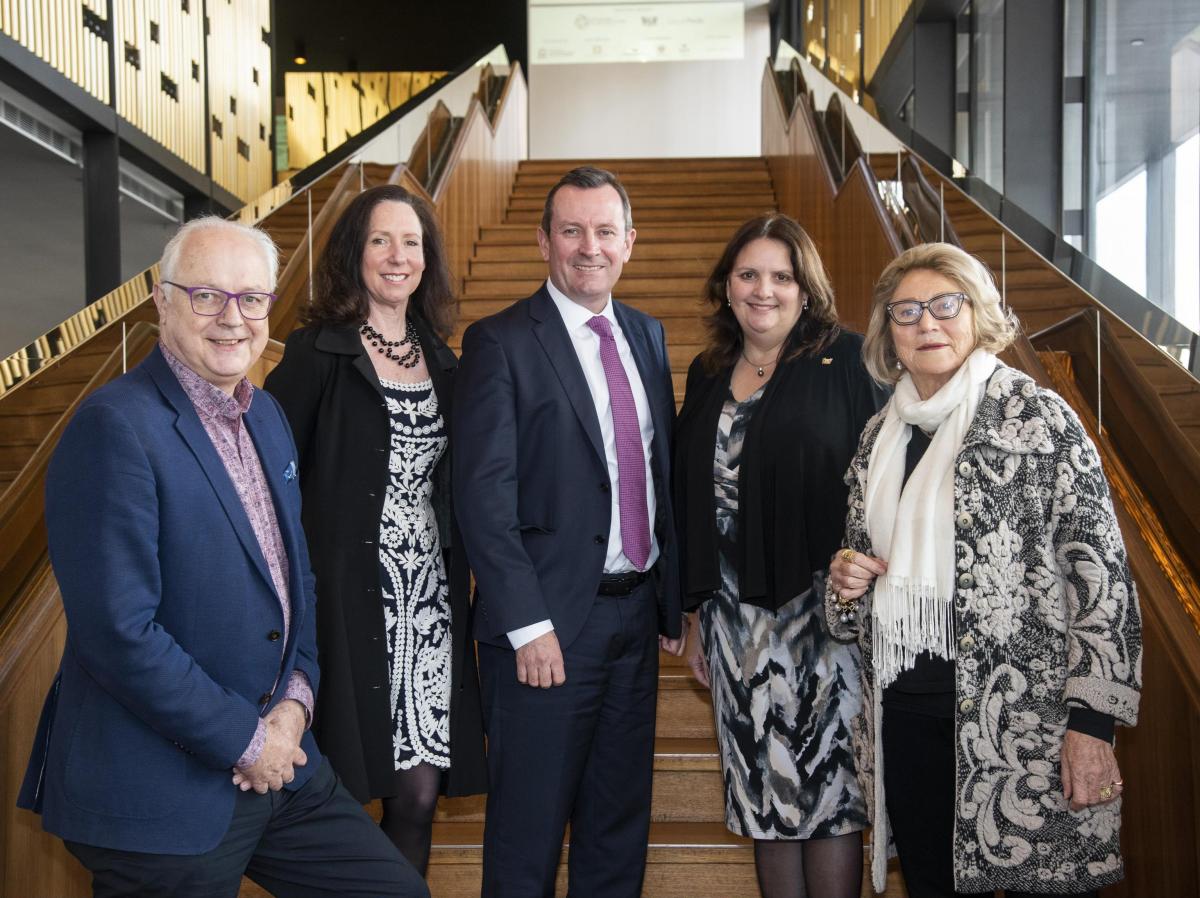Left to right: Henry Boston, Executive Director of The Chamber of Arts and Culture Western Australia Helen Cook, Chair of The Chamber of Arts and Culture Western Australia, Mark McGowan, Premier of Western Australia, Gay McMath, Commissioner of City of Perth Janet Holmes à Court, Deputy Chair of The Chamber of Arts and Culture Western Australia. REMIX Academy Perth. Image supplied.
So much of what we learn in the arts comes from doing – which is why conferences and events such as the recent REMIX Academy Perth are invaluable, offering an opportunity for creatives to come together to share their successes and the lessons they’ve learned along the way.
But if you didn’t make it to Perth for the second iteration of REMIX Academy Perth – and many didn’t as it sold out quickly – we’ve got you covered.
ArtsHub asked Henry Boston, Executive Director of the Chamber of Arts and Culture WA for his top four key takeaways from the conference, which in 2018 explored the themes of cultural tourism, space activation, and the evolution of new platforms for telling stories.
1. Have a clarity of vision and remain true to it. Know why the organisation exists and not just what it does.
Robbie Brammall, Director of Marketing and Communications, MONA, said one of the keys to the museum’s success is its clear and authentic brand identity.
‘David Walsh, who founded MONA with a theme of Sex and Death, offered Brammel this advice when he hired him, “Fail if you have to. Upset people if you can. Just don’t let MONA drift to the middle.” Subsequently everything has been about being a disruptor that challenges the audience,’ said Boston.
This emphasis on clarity and remembering why the organisation exists continued in the observations of Time Out CEO Michael Rodrigues. During his talk at REMIX Academy Perth, Rodrigues said that while most organisations can tell you what they do, they can’t always tell you why they do it.
‘Knowing why you exist helps you to stay true to your identity. Time Out was created to encourage people to go out and enjoy the world. It has diversified its business but remained true to the purpose,’ said Boston.
‘Rodrigues gave the example of Time Out Market in Lisbon, a food hall started in 2014 where everything has been chosen, tasted and tested (with four or five stars, and not one star less) by an independent panel of city experts: Time Out’s own journalists and critics.’
Another lesson here is in audience development and brand awareness: ‘be aware of the difference between impact and reach. The deeper the engagement the greater the impact.’
2. Be authentic in all that you do and take on, ambitious in what you want to achieve and aspirational in future planning.
‘Authenticity, ambition, and aspiration were common themes throughout the conference,’ said Boston.
Amanda Morrison, head of independent film and TV producer Komixx Entertainment’s Asia Pacific office based in Perth, observed that authenticity is the key when developing online content for a particular market.
‘We are in a post-critic world because the core fans now have all the power,’ she said.
Ekow Eshun, Creative Director of Calvert 22 Foundation, which supports the creativity of the New East – encompassing eastern Europe, the Balkans, Russia and Central Asia – said that the organisation’s digital publishing project Calvert Journal was driven by embracing talent, knowing the New East and finding the truth in the stereotype; to convey an authentic picture of a complex group of cultures that doesn’t shy away from, or sugarcoat reality.
Closer to home, Kira Fong from Goolarri Media Broome also spoke of the experience of creating the multi-disciplinary A Taste of Broome so that authentic stories could be told to residents and visitors.
‘Goolarri Media had an ambitious vision and did not let lack of resources distract it from delivering the stories,’ said Boston.
3. Make sure you Connect with the community, Create the best conditions for artists to flourish and Care for the whole cultural ecology of your community.
This year, Yasha Young, creator and Executive Director of Urban Nation Berlin, presented as a guest speaker. ‘She emphasised the importance of “Connect, Create and Care” as a mantra that makes sure that artists are at the forefront of what the organisation does,’ said Boston.
What does Urban Nation Berlin do? It is known for transforming Berlin’s facades into a giant outdoor gallery with street art and neighbourhood projects that connect people with their city.
‘Yasha Young connected with the street arts community while a city building was being repurposed for Urban Nation so that the artists were ready to put their creative mark on the building. She believes that you must take care of the whole cultural ecology if the artists are to be supported and sustained. There is a danger that the intrinsic value of street art will be hijacked by advertising and commodification,’ said Boston.
4. Do not become so obsessed with technology that you lose connection with the real world. Use digital technology as a tool and keep the artist central.
Because REMIX focuses on the intersection of culture and entrepreneurship with technology, how we use new technologies today in the arts and cultural industries was an important thread of discussion throughout the conference.
In her opening keynote, Marcela Sabino, Lab Director of the Museum of Tomorrow, Brazil, talked about the impact AI and robotics have on the way that we interact with the world.
‘These changes should not be feared but harnessed by people to tell our stories in different ways,’ said Boston.
Hussain Currimbhoy, Programmer of Documentaries at the Sundance Institute, also focused on technology, charting the progress of digital imagery from Eadweard Muybridge’s early work in motion-picture projection through to VR. He also shared some of the current AR practices which brought together cross-disciplinary practice to tell compelling stories.
The dangers of individuals becoming disconnected from their consciousness through overuse of technology was also discussed by entrepreneur and author Tenille Bentley, and Yasha Young closed the conference by reminding the audience that artists must be kept central to any creative enterprise.
‘Place the human factor above the technology,’ said Boston.
REMIX Academy Perth is presented by the City of Perth and the Chamber of Arts and Culture WA, and supported by State Government through the Department of Local Government, Sport and Cultural Industries.
Visit remixsummits.com/perth to find out more.






